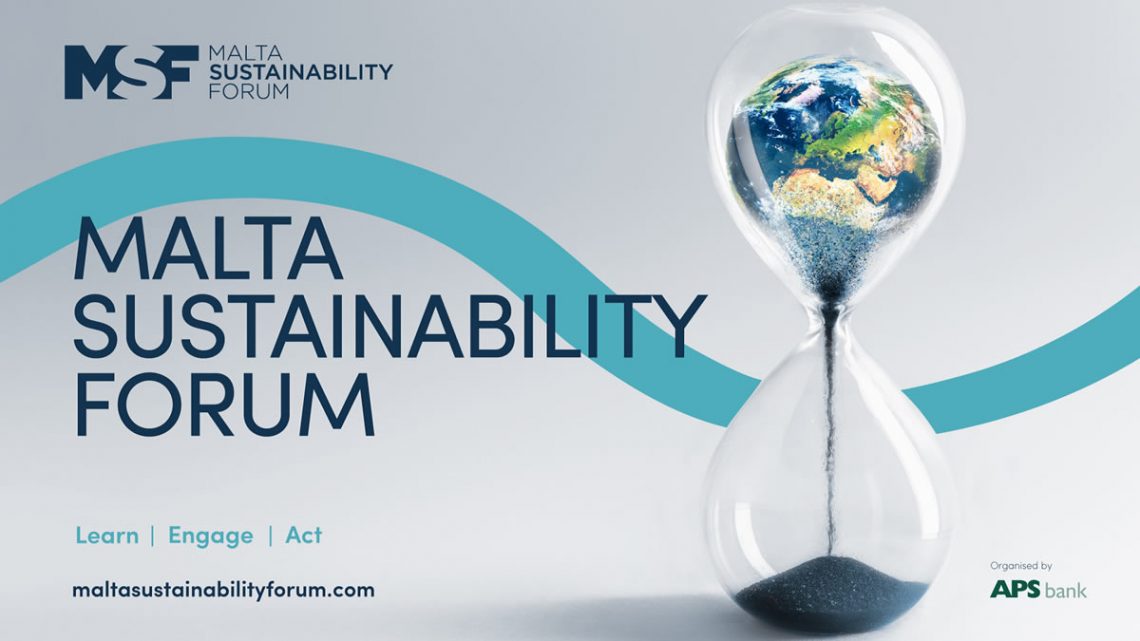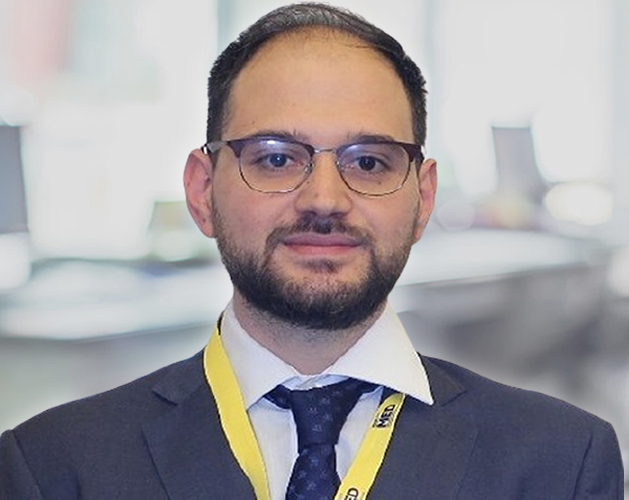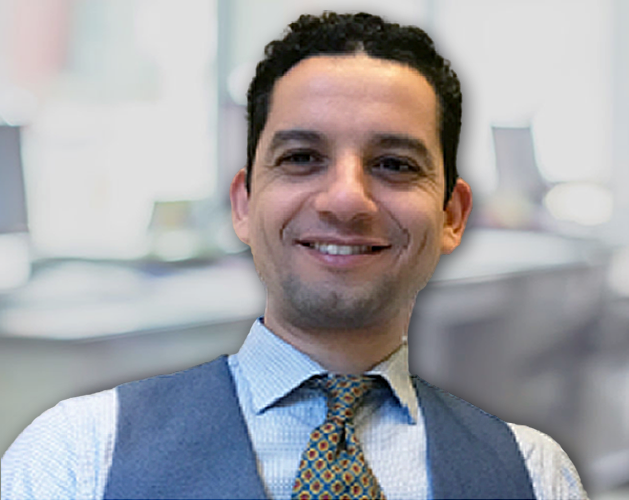
The Malta Sustainability Forum opened its virtual doors for five days of thought-provoking debate about some of today’s most significant sustainability opportunities and challenges. Attendees tuned in to follow the debate, participate in polls and pose their questions. The Ngo MACTT also followed the forum with its members Domenico Letizia (PR Manager) and Abdessamad El Jaouzi (Head of the Sustainable Economy). We share below a summary of the topics addressed.

(PR manager -MACTT Ngo)
Ocean Plastic Pollution
Dr Yanika Borg moderated this module, examining the challenges and issues caused by ocean plastic pollution and how this can be tackled by individuals, within businesses and at government level. The panellist presented and discussed, the following key points:
Will McCallum – the advantageous characteristics of plastic, such as its durability and light weight, are exactly same the factors which make plastic so detrimental to the environment. Plastic can be found in the most remote, uninhabited areas and deepest seas. It is impossible to remove plastic from our natural environment, as it moves around the seas easily and has even become part of our food chain, to the extent that micro-plastic makes up two thirds of the plastic waste.
Daniel Webb noted that single-use plastic makes around 90% of plastic being used. Plastic has other damaging implications in the form of cost, health and climate. In terms of costs, plastic has adverse implications on tourism and infrastructure (e.g. flooding). Plastic may be damaging to the human health, as plastic moves through the food chain. Finally, plastic waste impacts the climate negatively.
Catherine Chabaud advocated that legislation should tackle the whole life cycle of waste for a holistic and comprehensive solution. Although, governments around the world are acting at a speed never seen before, more needs to be done.
Martina Cutajar argued that governments and policy makers are to be held accountable for their actions.
A number of speakers referenced the International Plastic Treaty being discussed at UN, where responsibility should prevail over sovereignty.
The speakers also noted that marine pollution requires mobilisation by all stakeholders. Apart from legislation, governments can incentivize plastic manufacturers to invest in alternatives. Households should opt for eco-friendly products, followed by recycling as a final measure. Businesses should make use of reusables as much as possible.
Education is an important piece of the puzzle to raise awareness. Louise Tremewan demonstrated how children at school can be educated on types of plastic waste and its adverse implications, which can have a ripple effect at home and the community.
All the speakers agreed that ocean plastic pollution has reached a point of no return. Yet, we are in time to take the necessary actions to avoid a worst-case scenario.
How can International cooperation support Malta’s sustainable agenda?

A panel of Ambassadors and the Head of the European Commission Representation in Malta moderated by Diana Cacciottolo presented their ideas on how Malta can benefit from the UN’s emphasis on international cooperation to achieve the 2030 Agenda for Sustainable Development.
H.E. Dr John Paul Grech detailed how as part of the UN Agenda, Malta has undertaken a number of projects in the area of sustainability by engaging with Africa and small islands. This includes research which assists in the creation of jobs, environmental protection and financial contributions.
H.E. Mrs Vanessa Frazier elaborated on Malta’s progress in reaching the SDGs. The goals were reached in the areas of fisheries and biodiversity. Yet compared to the other EU members, Malta tails the group in terms of scoring.
Dr Elena Grech referred to Malta’s Green Deal commitments, where she stressed that every member must do its part. It was noted that Malta is receiving financial assistance from the EU.
Dr Elena Grech pointed out that as Malta recently grew economically, so did its emissions. H.E. Mr Walter L. Hassmann stated that nowadays the challenge for Malta is to balance the need to provide infrastructure and liveable space to its citizens.
H.E. Mr Frederik Lammert Keurhorst referred to the Dutch example. The Netherlands is moving to consumption reduction, zero emissions, industry re-structure and cycling for example. This requires coordination in all these sectors. He invited Malta to investigate these initiatives.
H.E. Mrs Brigitte Curmi lauded Malta for inviting H.E. French President François Hollande for the Commonwealth Meeting in 2015. This had a huge impact on climate change discussion in the Commonwealth. Reference was also made to the election of Biden and the USA joining the Paris Agreement.
H.E. Mr Frederik Lammert Keurhorst stated that Covid-19 showed the importance of global action and the need to adapt lifestyles to the address the current environmental issues.
In the EU, there were instances were member states had acted individually. However, the recent EU coronavirus response highlighted solidarity in the EU.
H.E. Mrs Brigitte Curmi referred to Malta’s strategic position in the Mediterranean, and thus its important role vis-à-vis Africa.
All Ambassadors made calls for global action and multilateralism in the area of sustainability.

(Head of the Sustainable Economy – MACTT Ngo)
Food for planetary wellbeing
In Food for Planetary Wellbeing, Prof Suzanne Piscopo moderated the panel discussion around the aspects of sustainability in relation to food, unravelling how our food choices and diet impact climate change, biodiversity and food security.
Prof Piscopo referred to media reports on food problems and its adverse impact on the environment. She posed the question: what is being done to solve the food problems we are facing?
Prof Jasia Steinmetz highlighted the interconnection between modern food production and the environment. She listed biodiversity, energy, water and soil as being acutely compromised, which in turn adversely affect food supply, human health and sustenance.
Malcolm B Borg contended that the move from family farms to food mass production is the main causation of the concerns identified by Prof Steinmetz.
Jeanette Borg referred to the importance of consuming local products. Domestic farmers are to be assisted both through incentives and direct access to markets.
Prof Steinmetz indicated that lab grown food are not a solution per se but focus should be on providing the right technology to farmers to maintain a sustainable system.
Prof Barbara Burlingame referenced a report by the Committee of World Food Security, which recommends that policy makers at least address agriculture, nutrition, health and environment when addressing the food issues.
All speakers referred to the so-called illusion of choice, where food choice appears massive, but the variety of food production is limited to a restricted range of crops which impedes the potential health benefits that could be derived from consuming the food.
Elliot M Berry upholds the Mediterranean Diet 4.0 as most sustainable and healthy. All speakers argued that customers are the driving force in steering food production to sustainable approaches. Changing the food culture through education is key, for instance one third of the food produced goes to waste.
Finally, Stefania Calleja presented practical tips for sustainable food choices and preparation, including home grown food.
Urbanism – The “doughnut model” a tool for transformative action
Urbanism – The Doughnut Model: A Tool for Transformative Action, moderated by Jacques Borg Barthet, Director of Practice, AP Valletta. What is the doughnut model? How can it help create sustainable cities and could it be applied to Malta?
The Doughnut Model, conceived by UK economist Kate Raworth, is a development model for cities that respects the boundaries between the planet and society, to make sure that nobody falls into the hole of the 12 social foundations in the middle of the doughnut and, at the same time, the 9 planetary boundaries are not overshot.
Philadelphia, Portland and Amsterdam were analysed in terms of the Doughnut Model. Juan-Carlos Goilo shared examples of how Amsterdam is stepping up to the challenge of providing sustainable social housing to its citizens.
These analyses are used as city selfies – to assess how cities are shaping themselves to fit the doughnut. Joeri Oltheten outlined how Curacao embarked on this process in 2020, in response to the outbreak of the pandemic. A major challenge in Curacao is that all food is imported, country is not self-sufficient.
Malta’s ‘selfie’ was presented in a short film, Malta in the Mirror. High GDP growth, unbridled construction and increased traffic are putting pressure on environmental resources, with long-term sustainability challenges. This might affect competitiveness of the economy going forward, as well as the social wellbeing of the residents.
Doughnut Model and policy-making: a chance to re-shape cities and urban environment for the post-pandemic world. Victor Agius described the similarities and differences between Singapore (with a hinterland and part of an economic region – to absorb demand on the environment) and Malta (which lacks both features).
Sustainable urban design and planning which removes social alienation takes centre stage in the Doughnut Model, especially for a small island state like Malta, as it adds attractiveness to the city proposition by putting back the human being at the centre of the city project.
Long-term political support, not interference, nor just in manifestos, is required to adopt the Doughnut Model successfully, with strong social, political and economic institutions providing the right governance framework.
Quality of life and wellbeing cannot be replaced. Lack of green and social spaces weighs on people’s mental health, with this being exacerbated by the recent lockdowns. Urban planning post-pandemic needs to take into consideration these challenges, rather than just economic progress. “You cannot breathe money.”
Valletta is a city that has reinvented itself recently, adding a social interaction dimension which was lacking for many years: a good example of one of the aspects of the Doughnut Model in action.
Pitching for GOOD
This module focused on meeting individuals and entrepreneurs who embrace sustainability as their strategic focal point.
Phil Richards of TAPP Water, Malta described his efforts to entice local residents into investing in filtered tap water, which is good quality and 90% cheaper than bottled water to mitigate pollution from PET, which breaks into micro-plastics and contaminate the oceans for decades.
Darren Borg set up his company in 2017, Rebels with a Cause to manufacture products using friendly alternatives to plastic such as bamboo and paper, which are now widely distributed in Malta. Use of single-use plastics creates a loss for the global economy of $80-120 billion each year.
Louisa Attard of Inspirasia Foundation which launched Social Impact Awards in Malta, creating opportunities for changemakers, offering them financial and non-financial support for their social and environmental initiatives.
Gonca Kara, senior researcher at EIT, presented the Climate-KIC Hub, a Europe-wide programme engaged in researching climate change issues and promoting innovative solutions to tackle them by engaging young generations.
Claire Ciancio of Greenroads and Camille Bon of Project Aegle discussed excessive car use as a global issue, with traffic congestion in Malta costing the country €200 million annually. Alternative transport solutions are being set up, including Green Trips, which Claire and Camille launched, a platform promoting alternative mobility solutions in the community.
Luca Caruso, an architect leading Building Performance Design at MEDmeUP, talked about the impact of the construction industry on the environment, which consumes 10% of global energy, produces 40% of waste and consumes 12% of global water resources. Green buildings and regenerative buildings were offered as a sustainable way forward to mitigate such high impact on the planet’s resources.
Leading with Purpose
In Leading with Purpose moderated by Wim Vermeulen, four locally-based business leaders demonstrated how organisations no longer exist for the sole purpose of profit, but also to play a role in making the world a better place.
Wim Vermeulen kicked off the discussion, posing the question: what is corporate purpose today? He proposed organisations should incorporate sustainability in the company purpose as not doing so will threaten their own existence and the lives of future generations.
Mark Weingard stressed that leading takes place by showing the way and having a direction. He referred to the importance of profitability, however, he highlighted that companies should take up the challenge of delivering ‘extra’ purpose. This includes caring for society.
Maria Micallef stated that a growth mindset, which includes awareness of the organisation’s impact on the ecosystem, is required to achieve a business vision. The company she represents fixed its objectives to sustainable goals focussing on products, plant and people.
The corporate purpose is in the DNA of the company, Mark Weingard emphasized. He argues that this involves acting with the community in mind.
Nikhil Patil stated that the challenges faced by businesses today are social inequality, climate change and digital exclusion. The company’s purpose is to tackle digital exclusion, whilst creating jobs. Investment is being undertaken to reduce emissions by upgrading the infrastructure.
Franco Azzopardi pointed out that a company is set-up to endure for future generations. He argued in favour of instilling a sense of purpose by establishing a sustainable mindset.
Maria Micallef stressed the risks of high taxation and tighter regulation as a consequence of inaction. Other speakers agreed and referred to the UN Climate Change Conference of the Parties (COP26).
The panellists shared examples of campaigns, initiatives and projects to drive purpose, undertaken internally and externally, by the organisations they lead.
Mark Weingard pointed out that to lead with purpose is to lead by example. Franco Azzopardi further elaborated on focussing on governance, close and regular contact with employees and for them to understand and feel passionate about their company serving society.
Maria Micallef read out a letter to her great grandchildren and elaborated on the world and legacy she wishes to leave behind. She gave them counsel to live an impactful life with the unique talents they possess.
The full-length video will be available soon on our YouTube channel.
The transition to a carbon neutral economy
Sam Baker moderated The Transition to a Carbon Neutral Economy module. The panel discussed how businesses can face the urgent challenge of Europe becoming carbon-neutral by 2050, to help build a better future for all.
A staggering 89% of the online poll participants, responded that “we are not taking climate change risk seriously enough”, this dropped to 56% at the end of the session.
Michael Zammit Cutajar, who has been active in UN climate change negotiations since 1991, presented his views on the issue. Global warming is unequivocal and influenced by human activity, creating the challenge of “endurance” for humankind through much harsher climatic conditions in the future. Positioning sustainability from being a “burden” to being an “opportunity”. Political commitment to tackle global warming is not uniform across the continents.
A clip shown from the documentary, The Decade of Action makes it clear that a 3C° increase in global temperatures by 2050 would represent a point of no-return from catastrophe, as the planet would not sustain human life any longer.
What is driving organisations to change in order the tackle climate risk? 79% of organisations responded “customers and consumers”, hence there is a business case to be sustainable.
Basima Abdulrahman, CEO of KESK, a green building consulting company based in Iraq and focused on post-conflict reconstruction, highlighted the challenges of putting climate change high on the political agenda, in a country recovering from a long period of war. As cities consume 80% of global energy, green building is the key strategy to achieve the most meaningful reduction in carbon emissions world-wide.
Olaf Zahra, CTSO of Toly Products, put the accent on how technology shifts can help reduce CO2 emissions in manufacturing processes.
David Xuereb, President of the Malta Chamber of Commerce, pointed out that the pandemic crisis has accelerated certain trends which will help tackling climate change, like teleworking, which reduced commuting to work, hence pollution. Securing political willingness to act and promote education was pitched as the key to dealing with the barriers to effective climate risk mitigation.
Mauro Cozzi, CEO of Emitwise, highlighted that the market for energy efficiency, carbon reduction and sustainable procurement is still at a nascent stage. Awareness programmes like the ones developed by the UN, are critical to push carbon-reduction initiatives forward.
Geoffrey Debono, CEO of Debono Group, described the increased interest from customers towards sustainable mobility solutions, both in terms of hybrid cars demand, car-sharing and other alternative mobility means, which are preferred mostly by customers below 30 years of age.
Was COVID-19 good or bad for climate change? Paradoxically it was positive, as pollution decreased and use of buildings became more efficient (live, work and study from one place (home), resulting in a reduction of GHG emissions. This paves the way for future decisions in the post-COVID reality.
Women
The module on Women, moderated by Neil Camilleri, addressed equality, gender quotas and the impact of Covid-19 on women’s place in society.
H.E. Dr Marie Louise Coleiro-Preca, President Emeritus of Malta, gave a keynote speech, highlighting how countries led by women (Germany and New Zealand, for example) have dealt with the COVID-19 crisis better than others. Women have been negatively impacted by the pandemic much more than men, with a deterioration in the gender gap over the last year and a worrying increase in domestic violence. In an online poll held during the module, 88% of the respondents replied that not enough has been done in Malta to tackle domestic violence.
The gender pay gap in Malta in financial services is 28%, a very high number, considering financial services’ workforce is becoming predominantly female. Also, the parliamentary representation of women is very low, at 13%. 73% of respondents to a second online poll agreed that a mechanism for diversity quotas should be in place.
The President Emeritus concluded that women, alongside men, can be key to the essential revival of our economies post-COVID.
Mariella Camilleri enumerated the various advantages of having women in leadership positions, such as attention for work-life balance and empathy with employees and customers alike, leading to better corporate performance and profitability. However, female participation in the workforce is discouraged by societal pressure.
Dr Lara Dimitrijevic explained that women must be afforded the right conditions for their increased participation in society, politics and the economy. For example, parliamentary sessions should adapt to school times, for female MPs to be able to attend to their children’s needs and participate in parliament.
Neil Camilleri asked the panellists if Malta would have fared better through the pandemic under a female Prime Minister. Replies pointed to the fact that the country fared quite well under its current leadership.
Simona Scarpaleggia described the activities of her organisation, which certifies companies in terms of gender equality (SDG 17), an important component of organisations’ ESG posture.
Dr Marceline Naudi analysed the root causes of domestic violence, which are to be found in the wrong belief that women are less worthy than men overall.
Dr Sabine Agius Cabourdin explained how promoting education for vulnerable women works towards improving gender equality, creating opportunities that otherwise would not be available to them.
Audrey Friggieri spoke about the essential role of schools and the media in promoting a change in mentality – paving the ground for women to access positions of leadership that historically have been the exclusive remit of men.
Sustainability Reporting
Michael Ganado started the discussion by highlighting that company purpose is changing and as a result also reporting requirements. A shift is being observed where stakeholders look at company’s long-term sustainability.
Natalie Dogniez referred to the observed movement from environmental, social and governance (ESG) factors to sustainability reporting. A starting point is to understand where the market stands, where it is noted that several institutional investors are moving towards ESG assets.
In terms of disclosure, the Non-Financial Reporting Directive (NFRD) is currently mandating reporting in this area. However, it is principled based and limited to large companies.
The Sustainable Finance Action Plan, published in 2018, is expected to reshape the financial system according to Natalie Dogniez. Its main objectives are sustainable investments, sustainability risks and disclosure. She also noted that globally, the EU is leading the way.
Natalie Dogniez further explained that last year two regulations came into force. The so-called Taxonomy Regulation defines environmentally sustainable activities, whilst the Sustainable Disclosure Regulation provides stricter requirements on what to report.
Michel Ganado queried whether actions are being taken at an EU level. Natalie highlighted that although the EU is leading the way, other continents are taking some form of action as well.
A member of the audience asked about the reporting burden imposed on the financial system. Michel agreed and stressed the importance of proportionality to be adopted by the EU legislators.
Another question was posed on whether the Key Performance Indicators are to be defined by the EU or at company level. Natalie Dogniez replied that it is still work in progress at EU level, yet she favours principle-based approach.
Michel Ganado queried whether demand for ESG assets is concentrated in the younger generation only. Natalie Dogniez pointed out that its mostly an across the board phenomena.
Natalie Dogniez concluded that sustainability reporting actually helps firms to incentivize value creation. Michel Ganado closed the discussion by stating that with regards to ESG “the time to act is now”.
Youth: Proposals for a better future
The session started with a video highlighting the 17 UN Sustainable Development Goals for 2030. Sophia Kianni, Eman Borg, Steve Zammit Lupi and Alexia Micallef Gatt, all young activists in the field of sustainability, explained the motivation behind their commitment for environmental and social causes.
Hon. Miriam Dalli, Minister for Energy, Enterprise and Sustainable Development was interviewed by Andras Volom, founder of V4SDG. Minister Dalli explained how the involvement of young people in ESG issues is critical for the effective deployment of policies and measures, which address climate change, gender and social inequalities, and all other sustainability challenges, which we face today.
Minister Dalli talked about the challenges faced by young women in entering politics and decision-making roles, and the need to balance political representation, which is currently uneven, particularly in Malta. She encouraged young people, both men and women, to challenge the status quo.
Minister Dalli highlighted that economic growth and sustainability are converging goals and do not mutually exclude each other. In fact, sustainability is the only possible model in our time to achieve long-term economic growth.
Respondents to an online poll agreed that the main ESG concern of our times is climate inaction, followed by quality of education. In a related poll, 70% of respondents stated that they are already taking part in the fight against climate change.
Gabriella Cassola interviewed a number of young environmental and social activists, who described their involvement in the ESG area:
Sophia Kianni, for example, got started by looking for potential solutions to the ESG issues faced by her country of origin, Iran.
Eman Borg, a young activist, promoted awareness of LGBTI rights on the island of Gozo.
Alexia Micallef Gatt, described her commitment in the field of education, teaching young students the basic principles of environmental conservation and social inclusion.
A video was shown, where young activists from all continents called for concrete action on environmental issues following the signing of the Paris agreement in 2016, with the slogan: “Fight for one point five”.
Vladislav Kaim, UN Secretary General’s Youth Advisor, presented his views on how youth can contribute effectively to fighting climate change and give frank and fearless advice to policy makers.
Andras Volom described the hurdles he had to face for V4SDG to start its activities in Central and Eastern Europe and promote the ESG message across different sectors of society.
Steve Zammit Lupi, Zebbug Local Councillor, talked about his efforts to develop new green areas and tree planting in his locality.
Coline Robin, Graphic Recorder, Illustrator and Artist captured the live discussion in a digital graphic illustration as she followed the panellists’ contributions throughout the event.

